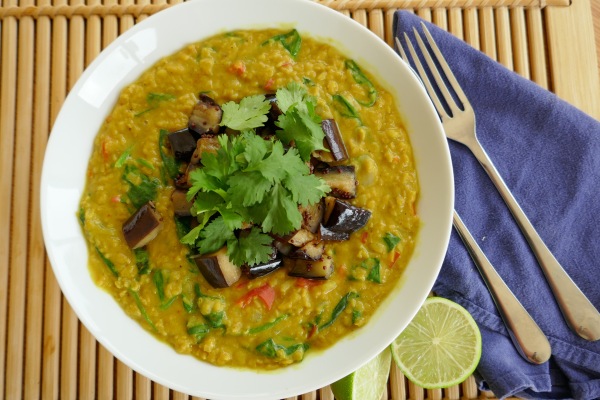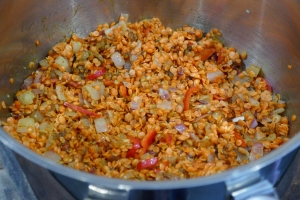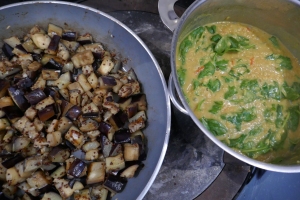
As the days get a little shorter and the weather a little cooler, I find it quite exciting to turn to more comforting, nourishing and warming meals. This meal feels like its packed with goodness to give the body a generous boost of nutrients, helping to support the body’s defences to keep the winter bugs at bay! The chilli, garlic and ginger are known to help the immune system, garlic has antiviral properties and ginger helps reduce inflammation. Food has the power to harm or heal the body and by making a few changes to our diet we can make a profound effect on the health of our body and well-being. The ingredients in this recipe are also amazing for supporting the health of the heart and circulatory system. Read on after the recipe to discover how these every day ingredients can support heart health.
I love a quick and easy recipe that I can cook for the family when they all arrive home starving hungry! This fits the bill perfectly and leaves us all feeling so good. The flavours are among some of my favourites and I use them regularly in my cooking. I love the warmth of the spices blended with the creamy coconut milk and lentils and I’d happily eat aubergine almost every day! If you do have leftovers, just add the aubergine to the dal and store in a sealed container in the fridge. It can then be reheated gently the next day. Just remember to stir it regularly until it begins to simmer, then serve piping hot!
Serves 3-4
4 tbsp coconut oil
1 red onion, finely chopped
3 garlic cloves
1in piece ginger, peeled and finely chopped
1 red chilli
1 tbsp ground coriander
1tsp ground cumin
1tsp ground turmeric
175g red lentils, rinsed
400ml can coconut milk
salt and black pepper
2 aubergine
1 tbsp mustard seeds
100g bag baby spinach leaves, washed and drained
plenty fresh coriander and lime wedges to serve
 Heat 2tbsp coconut oil in a medium sized saucepan, add the onion, 1 clove crushed garlic and the ginger and cook for 2 minutes. Halve, deseed and slice the chilli, stir into the onions with the spices and lentils, cook for a further minute, stirring continuously. Stir in the coconut milk, refill the can with water and add to the pan. Season well.
Heat 2tbsp coconut oil in a medium sized saucepan, add the onion, 1 clove crushed garlic and the ginger and cook for 2 minutes. Halve, deseed and slice the chilli, stir into the onions with the spices and lentils, cook for a further minute, stirring continuously. Stir in the coconut milk, refill the can with water and add to the pan. Season well.
Bring to the boil, reduce the heat and simmer for about 25 minutes until softened and the mixture has reduced to a creamy consistency. Stir occasionally to prevent the mixture from sticking.
After 10 minutes, wash and chop the aubergine into cubes. Heat 2tbsp coconut oil in a frying pan and cook the aubergine for 10minutes over a medium high heat or until beginning to brown, stirring occasionally. Add the mustard seeds with the remaining 2 crushed garlic cloves and plenty of seasoning. Cook for a further 2-3 minutes, stirring occasionally.
into cubes. Heat 2tbsp coconut oil in a frying pan and cook the aubergine for 10minutes over a medium high heat or until beginning to brown, stirring occasionally. Add the mustard seeds with the remaining 2 crushed garlic cloves and plenty of seasoning. Cook for a further 2-3 minutes, stirring occasionally.
Stir the spinach into the dal mixture and allow it to wilt over a low heat
S erve the dal with a pile of aubergine on top and a generous sprinkling of fresh coriander. Serve a lime wedge on the side to squeeze over.
erve the dal with a pile of aubergine on top and a generous sprinkling of fresh coriander. Serve a lime wedge on the side to squeeze over.
Health Benefits
Coconut oil
Coconut oil is great to use in cooking as its stable at high temperatures. The omega 9 fatty acids present in the oil and medium chain density, meaning they are easier to break down and use as energy, therefore their impact on the elevation of blood fats after a meal is minimal.
Red onion
Red onions are high in flavonoids. These are phytochemicals present in vegetables and are responsible for giving them their colour. They are powerful antioxidants, which help protect cells and tissues from free radical damage. They benefit heart health by causing endothelial cells in the lining of the blood vessels to produce and secrete nitric oxide. This is a vasodilator, which causes the walls of the blood vessels to relax and widen. The result is a lowering of blood pressure and better circulation.
Ginger
Ginger stimulates the circulatory system. It contains compounds called gingerols which give the ginger is spicy flavour. These gingerols are vasodilators, which help relax the muscles in the blood vessel walls causing them to widen and therefore a reduction in blood pressure and an increase in circulation.
Garlic
Garlic is great for a healthy heart. It contains a compound called ajoene, which helps to regulate the rate and extent the blood clots. Excessive clotting can be dangerous to the heart and circulatory system, so eating plenty of garlic can keep blood flowing efficiently and help work towards minimising the risk of strokes and heart attacks.
Chilli
Chillies are a great vasodilator. They get their fiery intense heat from a phytochemical called capsaicin, which has a beneficial effect on the cells that line our blood vessels. It causes them to secrete a chemical called nitric oxide, which these cells naturally produce. Nitric oxide causes the muscles in the blood vessel walls to relax which cause them to get wider. This effect is hugely beneficial when looking at heart health and circulation as the wider the blood vessel, the lower the pressure inside which reduces the risk of damage to the internal lining of the blood vessels. Damage here can cause a plaque to form, which is responsible for clogging the arteries and can lead to strokes and heart attacks. The widening of blood vessels also help blood circulate to the extremities.
Coriander
There is some evidence that coriander can help lower cholesterol by stimulating the conversion of cholesterol to bile acids within the liver.
Turmeric
is an anticoagulant and also a strong anti-inflammatory. The yellow pigment is responsible for helping to control inflammation. This will help to protect against damage of the inner lining of blood vessels avoiding the build up of plaque, which can ultimately block the arteries.
Lentils
Lentils are very high in soluble fibre. This binds to cholesterol in the digestive tract and helps remove it from the body before it can be absorbed into the blood stream during the digestive process.
Red lentils also contain magnesium that helps the muscles in the wall of blood vessels to relax, helping to lower blood pressure.
Aubergine
Aubergines are an excellent source of fibre, which will bind to cholesterol and remove it from the digestive tract before it is absorbed into the blood stream. They are also a very good source of potassium, which facilitates the movement of fluid through the kidneys. This causes a diuretic effect, reducing blood plasma volume. This will then help reduce pressure in the vessels as there is less volume pressing against the vessel walls. Potassium can also help to relax the muscle in blood vessels, widening the ateries and reducing the pressure inside. Aubergine is also a good source of magnesium, which also causes the muscle fibres to relax. The overall effect of this is a reduction in blood pressure. A flavonoid found in the skin of the aubergine called nasunin has been shown to protect cell membranes from damage.

Yummy Sarah xxxxx >
LikeLike
Thanks Sue, I’m even having it for my dinner tonight!!
LikeLike
Sarah – this sounds great and your notes about the ingredients are really interesting. Might have to wait till I stay with you before I taste it! Brenda x
LikeLike
Thank you! I’ll happily cook it for you! xx
LikeLike
Ooh this looks delicious! How many calories would that be?
Sent from my iPad
>
LikeLike
I haven’t got a nutritional break down for it but its but its packed full of goodness so I wouldn’t worry how many calories, this ones completely guilt free!!
LikeLike